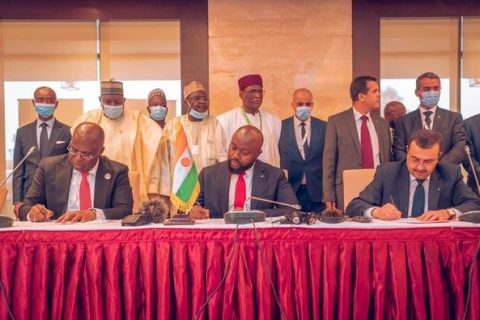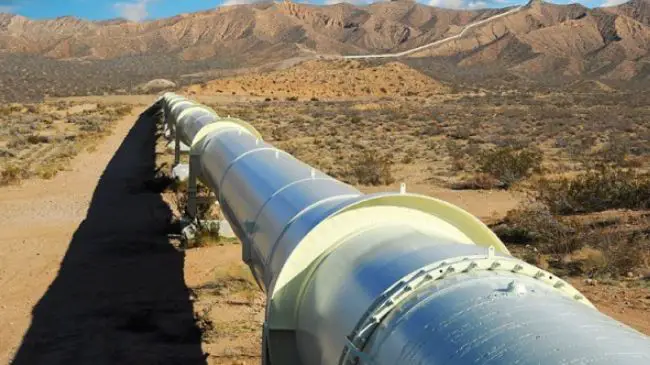Algeria, Niger, and Nigeria have yet again confirmed their commitment to the implementation of the Trans-Saharan Gas Pipeline (TSGP). In late July, a Memorandum of Understanding was struck by the energy ministers of the three nations during a meeting in Algiers.
Reportedly the ministers, i.e Mohamed Arkab of Algeria and his counterparts from Nigeria, Timipre Sylva, and Niger, Mahamane Sani Mahamadou, first discussed aspects of the project including the status of progress. At the moment, no indication has been given as to when the Trans-Saharan Gas Pipeline project will be completed.
The signing of the MoU in Algiers comes barely a month after the three countries established a task force and a roadmap for the development of the TSGP. This took place in a meeting carried out in Abuja. The meeting was attended by the Ministers of Petroleum in Nigeria, Niger, and Algeria. The Director Generals of national oil companies (NOCs) of the three African nations were also present.
The two-day meeting also resulted in the formation of a Steering Committee. The committee will be in charge of updating the TSGP feasibility study. It is made up of the three Ministers and the Director Generals of the NOCs.
The Niger minister of Petroleum commends all parties for taking this important step. He also sees the task force’s formation and the roadmap as key aspects of realizing the TSGP. Another meeting will be held in Algiers at the end of July 2022 to decide the way forward with the project.
Remarks on the establishment of the task force and the roadmap for the development of the TSGP
According to Sebastian Wagner, Executive Chair of the Germany Africa Business Forum, the African Energy Chamber (AEC) commends the efforts made by energy ministers and leaders of the NOCs of Algeria, Nigeria, and Algeria in advancing the Trans-Saharan Gas Pipeline.
He added that the creation of a Steering Committee and roadmap for TSGP, along with the recently concluded signing of an agreement between APPO and Afreximbank for the establishment of an African Energy Bank, is a big proof of how Africa can enhance cooperation and leverage domestic solutions to maximize its oil and gas market.
Wagner summed up by saying that they want to see a push from African financiers to assist in the rollout of TSGP.
By 2030, Africa will be free of energy poverty thanks to increased oil and gas exploration, production, and asset development.
A brief about the Trans-Saharan Gas Pipeline Project (TSGP)

The Trans-Saharan gas pipeline is a planned natural gas pipeline from Nigeria in the Western African region to Algeria in North Africa.
Also known as the NIGAL pipeline and Trans-African gas pipeline, the pipeline is set to start in the Warri region in Nigeria, run north through Niger, to culminate at Hassi R’Mel in Algeria. Here, the pipeline will connect to the existing Trans-Mediterranean, Maghreb–Europe, Medgaz, and Galsi pipelines that supply Europe from the gas transmission hubs at El Kala and Beni Saf on Algeria’s Mediterranean coast.
With a diameter of 48 to 56 inches, the pipeline will be 4,128 kilometers long. 1,037 kilometers of the pipeline will be in Nigeria, 841 kilometers in Niger, and 2,310 kilometers in Algeria. Its annual capacity will reportedly be up to 30 billion cubic meters.
The pipeline was originally expected to be operational by 2015 at an investment of about US$ 10bn. Its gas gathering centers according to initial estimates would cost somewhere around US$ 3bn.
Reported earlier
September 2021
Algeria revives plans for Trans-Saharan Gas Pipeline Project TGSP
The government of Nigeria is reportedly making strides towards the revival of the stalled Trans-Saharan Gas Pipeline project that has been on the pipeline since the 1970s.
The project, poised to run from Kano in Nigeria through Niger to Hassi R’Mel in Algeria, has faced numerous challenges over the years including opposition by environmentalists preserving the Niger River delta, and terror threats from the militant groups that threatened to attack the pipeline crew.
Also Read: Algeria signs contracts for implementation of Oil & Gas projects
Steps taken so far to the revival of the Trans-Saharan Gas Pipeline project
Recently, Toufik Hakkar, the head of Société Nationale pour la Recherche, la Production, le Transport, la Transformation, et la Commercialisation des Hydrocarbures s.p.a. (Sonatrach) announced that the technical layout for the construction of the pipeline had been completed.
The route for the TSGP, according to Mr. Hakkar, has also been decided and Sonatrach, which is an Algerian government-owned company formed to exploit the hydrocarbon resources of the North African country, is now preparing to engage in talks with Niger and Nigeria in regards to the implementation of the said project.
New impetus to Nigeria-Algeria relations
Mohamed Arkab, Algeria’s Minister of Energy and Mines affirmed that the government will pay special attention to the rapid completion of the Trans-Saharan Gas Pipeline Project “which will give a new impetus to the relationship between Nigeria and Algeria in terms of technical cooperation and capacity-strengthening”.
“This project will have a significant social and economic impact in the transit countries, within the framework of environmental protection and sustainable development,” added Minister Arkab.
Niamey declaration tripartite signed for Trans-Saharan Gas Pipeline Project (TSGP)

Nigeria, Niger, and Algeria signed a tripartite known as the Niamey declaration to relaunch the Trans-Saharan Gas Pipeline Project (TSGP). The ECOWAS Mines and Petroleum Exhibition Forum (ECOMOF 2022), took place from 16th February to 18th February 2022 in Niamey.
The three countries are aiming to see the project generate income and create job opportunities. The gas pipeline will start from Warri in Nigeria and reach Hassi R’Mel in Algeria via Niger with a length of 4128 kilometers.
A Task Force was set up during the meeting which is obligated to meet frequently with an aim of working together towards this direction and also to speed up the implementation of the commitments made by the three stakeholders. The stakeholders of the Trans-Saharan Gas Pipeline Project were represented by the Minister of Petroleum Resources of Nigeria, Mr. Timipre Sylva, the Minister of Energy and Mines of Algeria, Mr. Mohamed Arkab, and the Minister of Petroleum, Energy and Renewable Energies of Niger, Mr.Mahamane Sani Mahamadou.
Read also; License Issued for Construction of Solar Power Plant in Ghadames, Libya
Mr. Mahamane Sani Mahamadou praised his country for maintaining a good relationship with Algeria and Nigeria which resulted in bilateral discussions that yielded to the reactivation of the Trans-Saharan Gas Pipeline Project.
On the other hand The Federal Minister of Petroleum Resources of Nigeria, Mr. Timipre Sylva urged the African countries to unite and collaborate on projects capable of reducing the heavy burdens that weigh on each country taken individually. He also added that his country Nigeria is committed to reducing the cost of the project by constructing the largest part of the Trans-Saharan Pipeline in their territory which will be 614km long.
Economic growth
Mr. Mohamed Arkab who is the Minister of Energy and Mines in Algeria added that the Trans-Saharan Gas Pipeline Project’s success will see gains in growth and development of the regions where the gas pipeline will cross.
He also added that the holding of the Niamey meeting was proof of the excellent cooperation and partnership between African countries. He finished by saying that the project will be carried out by the three countries together until completion.

Leave a Reply